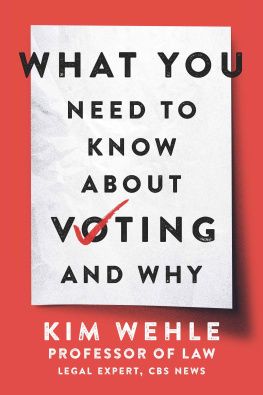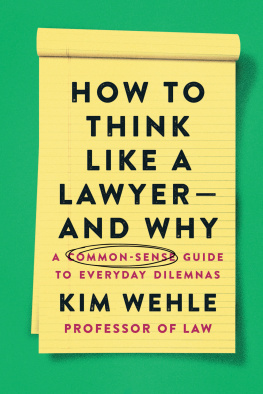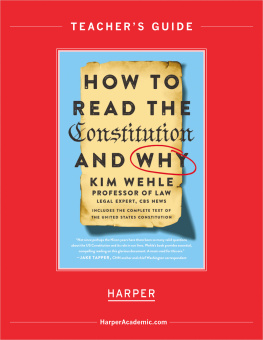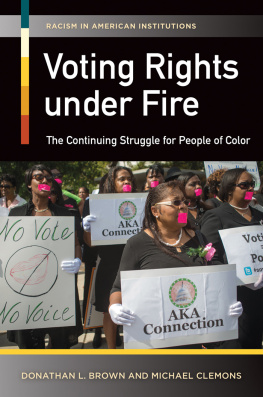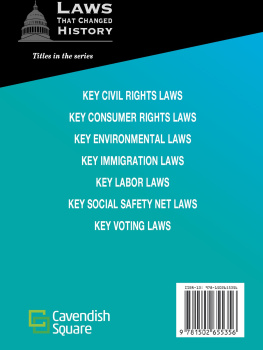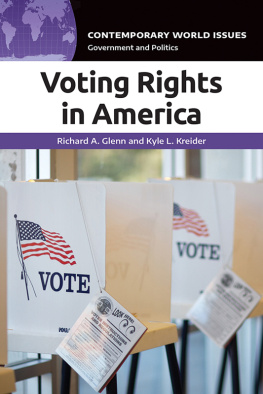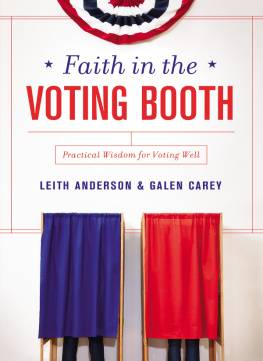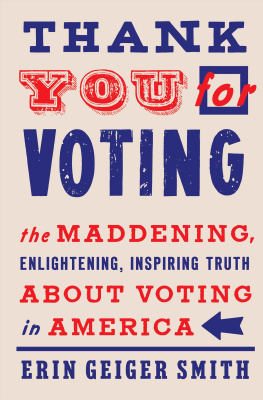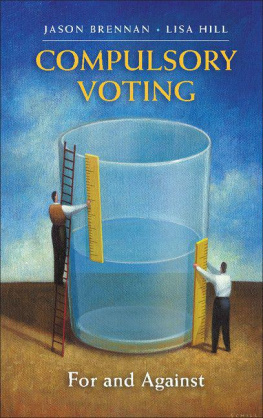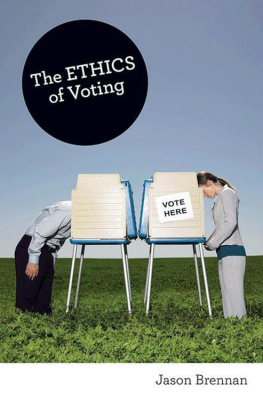Kim Wehle - What You Need to Know About Voting—and Why
Here you can read online Kim Wehle - What You Need to Know About Voting—and Why full text of the book (entire story) in english for free. Download pdf and epub, get meaning, cover and reviews about this ebook. year: 2020, publisher: HarperCollins, genre: Politics. Description of the work, (preface) as well as reviews are available. Best literature library LitArk.com created for fans of good reading and offers a wide selection of genres:
Romance novel
Science fiction
Adventure
Detective
Science
History
Home and family
Prose
Art
Politics
Computer
Non-fiction
Religion
Business
Children
Humor
Choose a favorite category and find really read worthwhile books. Enjoy immersion in the world of imagination, feel the emotions of the characters or learn something new for yourself, make an fascinating discovery.
What You Need to Know About Voting—and Why: summary, description and annotation
We offer to read an annotation, description, summary or preface (depends on what the author of the book "What You Need to Know About Voting—and Why" wrote himself). If you haven't found the necessary information about the book — write in the comments, we will try to find it.
Kim Wehle: author's other books
Who wrote What You Need to Know About Voting—and Why? Find out the surname, the name of the author of the book and a list of all author's works by series.
What You Need to Know About Voting—and Why — read online for free the complete book (whole text) full work
Below is the text of the book, divided by pages. System saving the place of the last page read, allows you to conveniently read the book "What You Need to Know About Voting—and Why" online for free, without having to search again every time where you left off. Put a bookmark, and you can go to the page where you finished reading at any time.
Font size:
Interval:
Bookmark:
How to Read the Constitutionand Why


WHAT YOU NEED TO KNOW ABOUT VOTINGAND WHY . Copyright 2020 by Kim Wehle. Illustrations by Penny Ross Burk 2020. All rights reserved under International and Pan-American Copyright Conventions. By payment of the required fees, you have been granted the nonexclusive, nontransferable right to access and read the text of this e-book on-screen. No part of this text may be reproduced, transmitted, downloaded, decompiled, reverse-engineered, or stored in or introduced into any information storage and retrieval system, in any form or by any means, whether electronic or mechanical, now known or hereafter invented, without the express written permission of HarperCollins e-books.
FIRST EDITION
Cover design by Andrea Guinn
Cover photograph kyoshino/Getty Images
Digital Edition JUNE 2020 ISBN: 978-0-06-297479-2
Version 05152020
Print ISBN: 978-0-06-297478-5
For my late parents, Betty Jane Nelson and Richard Edwin Wehle, who taught me about the importance of education and the privilege of having choices in life
Contents

T he 2020 presidential election is destined to be one of the most critical races in the history of the United States for one glaring reason: its pivotal for ensuring the integrity of our system of government.
Consider the stakes. You might be rooting for a second term for Donald Trump. Or you might be deeply invested in electing a new president in 2020. Either way, the 2020 election matters. If Donald J. Trump is elected to a second term, some will consider the office of the presidency in ruins, as having become above the law. If Trump is not elected to a second term, he could face indictment by a Department of Justice headed by a new president. Regardless of how one feels about Donald Trump, a former president in shackles would inflict its own kind of trauma on the reputation of the presidency and on the nation as a whole.
The 2020 race is the first presidential election since 2016. Although people disagree on what to do about foreign assaults on our electoral process, there is no getting around two troubling narratives involving recent presidential elections. Career intelligence officials have concluded that the Russian government hacked into the email servers of the Clinton campaign and the Democratic National Committee. It then enlisted WikiLeaks to publicly dump disparaging information on Hillary Clinton in an effort to influence an election that should have been decided exclusively by American voters. Witness testimony and documents made public in Donald Trumps impeachment also made clear that the president inexplicably withheld military aid to Ukraine while asking the new Ukrainian president to announce an investigation into primary rival Joe Biden for the presidency in 2020. Whether you like Trump-the-man or not, we all must accept that this type of behavior could be the new normal for the presidency in the twenty-first century: using the power of office to stay in power.
The 2016 presidential election was also the first in memory in which social media botscreated and manipulated by the Russians and other adverse foreign powersspread false information to regular Americans Facebook, Twitter, and Instagram accounts in order to manipulate individual votes. American internet users were targeted based on demographics and ideological viewswithout even knowing that the resulting information they considered in casting votes for president was falsely planted in their Google searches. Although former special counsel Robert Mueller completed his investigation into those Russian conspiracies in March 2019, Congress has done little to address the problem. The nasty Russian botsthat is, automated accounts that post lies on social mediaare still doing their thing in the lead-up to November 2020. (Note that, as a factual matter, this is not up for debate; Senate intelligence reports as well as the Mueller report document attempts by foreign actors to infiltrate voter registration and other voter data systems in a number of states in 2016).
Meanwhile, a stalemated, polarized Congress has made little progress on other issues that a majority of Americans care aboutsuch as health care, immigration reform, and measured gun control, just to name a few. The reasons for Congresss fecklessness are manifold. They include money in politics, gerrymandering, configuration in the Senate, the absence of term limits, increasingly entrenched partisanship, and a general lack of both courage and political will. There is a major disconnect between the needs and desires of individual voters and how our elected representatives are carrying out their mission in the halls of the legislatures. After the controversial and politically charged confirmation of Justice Brett Kavanaugh to the US Supreme Court, many Americans believerightly or wronglythat the federal courts cannot be trusted or reasonably expected to fix whats wrong in American government either.
For most Americans, the sole and pragmatic answer to Americas problems liesif anywhereat the ballot box. If we want change, we have to vote. But that solution presents its own problems.
For one, few people realize that the Constitution contains no express right to vote. Some view it as a privilege to be earned, even for citizens, while others feel it is the heart and soul of American democracy that should be both protected and enhanced more profoundly than any other right in America. This pitched battle around whether theres a right to vote, or whether only the right people should be able to vote, lurks below the surface of American consciousness and conversation. But it is real.
Usually, its couched as a debate over voter suppression (keeping people from the polls) versus voter fraud (impostors going to the polls). What part of this debate is myth and what is reality? How much should Americans have to do to prove that they are eligible to vote on voting dayparticularly given that federal criminal laws already create a strong disincentive to fake it at the ballot box? If there is a danger of fraud nonetheless, does that risk outweigh the danger of barring eligible people from having their voices heard in the democratic process? How best to strike that balance? There are no clear answers to these questions, which makes many of us uneasy.
Second, voting in America can be confusing because it can vary depending on where you live. Typically, fewer than 50 percent of eligible voters participate in American elections. Of the thirteen thousand different voting districts across the United States, few do things exactly alike. When it comes to the presidency, the Electoral College means that voters dont even cast a vote for the actual person who could be president. They cast votes for one or more electors, who then vote for the candidate favored by voters, but voters know little to nothing about electors. Those people arent legally bound to vote the way the voters say theyre supposed to, but they usually do. Thus, its that group of individuals who technically decide who will be the next president. Although electors generally go along with what the voters want, for a number of reasons, not all validly cast votes are ultimately impactful in that process.
But this is emphatically not to say that people shouldnt bother to vote. Voting is vitally important, even if an individual vote doesnt sway a particular election one way or another. It is the only way that We the People self-govern. The ability to self-govern is a privilege and a giftone that we honor by showing up at the ballot booth, even if your vote doesnt matter in altering a particular race. Its sometimes hard for Americans to fathom that not everyone on the planet enjoys the privilege of self-government. If we want to keep that privilege, we need to exercise it. By the end of the first chapter of this book, you will understand how to register and how to vote. (Voting is pretty easy.) And by the end of the book, you will understand why its extraordinarily important and meaningful, too.
Next pageFont size:
Interval:
Bookmark:
Similar books «What You Need to Know About Voting—and Why»
Look at similar books to What You Need to Know About Voting—and Why. We have selected literature similar in name and meaning in the hope of providing readers with more options to find new, interesting, not yet read works.
Discussion, reviews of the book What You Need to Know About Voting—and Why and just readers' own opinions. Leave your comments, write what you think about the work, its meaning or the main characters. Specify what exactly you liked and what you didn't like, and why you think so.

